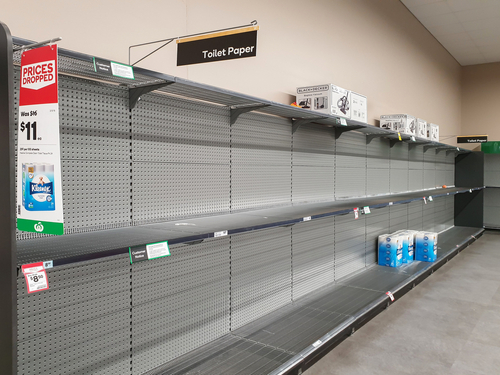The global economy continues to suffer from debilitating supply chain shortages as we head into the final months of 2021. With computer chips in short supply, Toyota has announced plans to slash its worldwide production of cars by 40 percent. Furniture giant IKEA says it is struggling to supply more than 1,000 product lines in the United Kingdom because of a shortfall of about 100,000 commercial truck drivers in that country. Hurricane Ida’s impact will be felt across North American supply chains, as fleets of trucks badly needed to free up bottlenecks in ports and distribution centers are diverted to disaster relief efforts.
Many experts predict that supply chain shortages and bottlenecks will not end any time soon. Supply chains for many products and goods are now global, made up of farms, factories, processing centers, logistics companies, and shipping routes all over the world. The interconnectedness of these vast systems increasingly allowed for the adoption of practices such as Just In Time Manufacturing, in which parts are delivered to a manufacturer just as they are required, minimizing the need to stockpile them.
These practices helped keep down costs and enhance efficiency for many businesses while allowing them to meet consumer demand. They worked well until the COVID outbreak disrupted global supply chains by shutting down or slowing production all over the world, and causing consumer demand for delivered goods and products to surge to unprecedented levels.
The arrival of vaccines brought a temporary sense of optimism to the worldwide business community. But the more transmissible Delta variant and the slow rollout of vaccines in various regions of the world continue to disrupt global logistics. About half the world’s sailors, a critical part of the supply chain labor force, are from developing countries with very low rates of vaccination. Many have been unable to work since the Delta surge. Meanwhile, labor, material, and container shortages have led to products and goods stranded for weeks at ports and distribution centers in developed countries.
Climate change disruptions continue to increase in number and impact, leading to more supply chain shortages. As noted above, the damage from Hurricane Ida has shifted logistics resources to disaster relief efforts. Wildfires in the American West, heavy floods in China and Western Europe, and droughts in South America are disrupting supplies of everything from lumber to chocolate to sushi rice.
Resiliency Over Efficiency
With supply chain shortages likely to continue through at least 2022, companies may need to focus on supply chain resiliency, rather than rely on efficiency strategies such as Just in Time Manufacturing. To stay competitive, manufacturers may want to invest in excess buffer capacity—which means having enough inventory in hand to stabilize any fluctuations they experience with regards to supply and demand, production capacities, and lead times. Manufacturers can invest in additional raw materials inventory in case a supplier is unable to deliver shipments on time. Buffering could also be important during the production process. If, for example, a finished product is a three-part process, and the first step requires more time, a company may want to keep a buffer inventory of completed first-step parts. This ensures the second and third steps won’t experience lag times .
Businesses may also consider diversifying their supply or manufacturing bases. Some companies had already invested in this before the COVID pandemic in response to the U.S.-China trade war, switching to new suppliers outside of China. They also asked existing partners to supply them from other parts of Asia, or from different regions altogether. While these measures do constitute an additional investment, they can help companies adjust to the disruptions and uncertainties brought on by both COVID and climate change. The cost of maintaining multiple supply locations should be seen as a cost of doing of doing business, rather than an inefficiency.
Increasing Efficiency Through Digitization
Other experts note that there doesn’t always have to be a trade-off between resiliency and efficiency. Digitizing the goods, processes, and logistics within a supply chain will incur an initial cost but pays great dividends in terms of data availability and operational analysis.
Utilizing internet-based blockchain technology, for example, allows companies to publicly validate, record, and implement transactions in encrypted ledgers at any point in the supply chain. This can help streamline routine processes and increase operating capacity. More importantly, blockchain, and other forms of logistics software, enables executives and managers to plan more strategically, and more easily find efficiencies within their network. Doing so can boost annual growth of earnings before interest by as much as 3.2 percent, according to one study.
Carefully selecting strategic partners will make digitizing a supply chain much easier. The ideal plastic pallet pooling company, for example, should have radio frequency identification (RFID) and other smart features built into their pallets, enabling companies that partner with them to capture shipping and distribution data at any point within a supply chain. Renting pallets from such a company also ensures that a constant supply of pallets is available for use when needed. This saves a business from having to manage its own pallet supply, reducing the complexity of pallet procurement and recovery, and reducing its Total Cost of Business (TCOB).
Many experts agree that supply chain shortages are unlikely to end in the near future. To stay competitive amid these shortages, logistics companies may need to focus on supply chain resiliency, or find new efficiencies through innovations like digitization.
Companies seeking solutions to supply chain shortages use iGPS plastic pallets for all their shipping needs. Our lightweight, durable, plastic pallets incorporate smart features that help ensure operational efficiencies and reduce your Total Cost of Business. For more information, contact us at 1-866-557-0047, email a specialist at switch@igps.net, or visit our contact page.



